References proceeded by an asterisk (*) have been used as support material and have not been cited directly in the text.
- Amos, Tori, and Ann Powers. 2005. Piece by Piece; A Portrait of the Artist: Her Thoughts. Her Conversations . New York: Broadway Books.
- *Day, Jess. 2020. What Do Toys Have to Do with Inequality? Let Toys Be Toys , October 16. https://www.lettoysbetoys.org.uk/what-do-toys-have-to-do-with-inequality/.
- *Erickson, Megan. 2011. Where Are All the Women Scientists? Big Think , September 27. https://bigthink.com/think-tank/where-are-all-the-women-scientists.
- Faludi, Susan. 1991. Backlash: The Undeclared War against American Women . New York: Crown Publishers, Inc.
- Fine, Cordelia. 2010. Delusions of Gender: How Our Minds, Society, and Neurosexism Create Difference . New York: W. W. Norton and Company.
- Fine, Cordelia. 2017. Testosterone Rex: Myths of Sex, Science, and Society . New York: W. W. Norton and Company.
- *Gittleson, Kim. 2017. Where Are All the Women in Economics? BBC.com, October 13. https://www.bbc.com/news/business-41571333.
- Grey, Sarah. 2016. Between a Boss and a Hard Place: Why More Women Are Freelancing. BitchMedia , August 2. https://www.bitchmedia.org/article/between-boss-and-hard-place-why-more-women-are-freelancing.
- *Hepworth-Sawyer, Russ, Jay Hodgson, and Mark Marrington, eds. 2019. Producing Music . New York: Routledge.
- *Hochschild, Arlie Russell, and Anne Machung. 1989. The Second Shift: Working Parents and the Revolution at Home . New York: Viking Penguin.
- Hopper, Jessica. 2015. The Invisible Woman: A Conversation with Bjrk. Pitchfork , January 21. https://pitchfork.com/features/interview/9582-the-invisible-woman-a-conversation-with-bjork/.
- *Ignatius, Adi. 2013. Where Are All the Women? Harvard Business Review , April 4. https://hbr.org/2013/04/where-are-all-the-women.
- Ingham, Tim. 2020. Spotify Dreams of Artists Making a Living. It Probably Wont Come True. Rolling Stone , August 3. https://www.rollingstone.com/pro/features/spotify-million-artists-royalties-1038408/.
- Jaffe, Eric. 2014. The New Subtle Sexism toward Women in the Workplace. Fast Company , June 2. https://www.fastcompany.com/3031101/the-new-subtle-sexism-toward-women-in-the-workplace.
- Kelan, Elizabeth. 2020. Why Arent We Making More Progress towards Gender Equity? Harvard Business Review , December 21. https://hbr.org/2020/12/why-arent-we-making-more-progress-towards-gender-equity.
- *Marcus, Ruth. 2017. Where Are All the Presidents Women? Opinion. Washington Post , September 15. https://www.washingtonpost.com/opinions/where-are-all-the-presidents-women/2017/09/15/f5bb1ff2-9a59-11e7-82e4-f1076f6d6152_story.html.
- McIntyre, Phillip. 2008. The Systems Model of Creativity: Analyzing the Distribution of Power in the Studio. Journal of the Art of Record Production 3 (November). https://www.arpjournal.com/asarpwp/the-systems-model-of-creativity-analyzing-the-distribution-of-power-in-the-studio/.
- Saini, Angela. 2017. Inferior: How Science Got Women Wrongand the New Research Thats Rewriting the Story . Boston: Beacon Press.
- Saujani, Reshma. 2016. Teach Girls Bravery, Not Perfection. TED2016 Talk, February. https://www.ted.com/talks/reshma_saujani_teach_girls_bravery_not_perfection.
- Schwartz, Barry. 2014. The Way We Think about Work Is Broken. TED2014 Talk, Vancouver, BC, March. https://www.ted.com/talks/barry_schwartz_the_way_we_think_about_work_is_broken.
- Schwartz, Barry. 2015. Why We Work . New York: TED Books, Simon and Schuster.
- Science Museum. 2020. Women in Computing . Sciencemuseum.org, May 31. https://www.sciencemuseum.org.uk/objects-and-stories/women-computing.
- *Solie, Ruth A., ed. 1993. Musicology and Difference: Gender and Sexuality in Music Scholarship . Berkeley and Los Angeles: University of California Press.
- *Solnit, Rebecca. 2014. Men Explain Things to Me . Chicago: Haymarket Books.
- Solnit, Rebecca. 2017. The Mother of All Questions . Chicago: Haymarket Books.
- Sweet, Elizabeth V. 2015. Beyond the Blue and Pink Toy Divide. TEDxUCDavis Talk, Davis, California, April. https://www.elizabethvsweet.com/tedx-talk.

CONVERSATIONS WITH WOMEN IN MUSIC PRODUCTION

An imprint of Globe Pequot, the trade division of
The Rowman & Littlefield Publishing Group, Inc.
4501 Forbes Blvd., Ste. 200
Lanham, MD 20706
www.rowman.com
Distributed by NATIONAL BOOK NETWORK
Copyright 2022 by Kallie Marie
All rights reserved. No part of this book may be reproduced in any form or by any electronic or mechanical means, including information storage and retrieval systems, without written permission from the publisher, except by a reviewer who may quote passages in a review.
British Library Cataloguing in Publication Information available
Library of Congress Cataloging-in-Publication Data
Names: Marie, Kallie, 1980 interviewer, author.
Title: Conversations with women in music production : the interviews / Kallie Marie.
Description: Guilford, Connecticut : Backbeat, 2022. | Includes bibliographical references.
Identifiers: LCCN 2021054961 (print) | LCCN 2021054962 (ebook) | ISBN 9781493065066 (paperback) | ISBN 9781493065073 (epub)
Subjects: LCSH: Women sound recording executives and producersInterviews. | Women sound engineersInterviews. | Sound recording industry.
Classification: LCC ML82 .C68 2022 (print) | LCC ML82 (ebook) | DDC 780.82dc23
LC record available at https://lccn.loc.gov/2021054961
LC ebook record available at https://lccn.loc.gov/2021054962
 The paper used in this publication meets the minimum requirements of American National Standard for Information SciencesPermanence of Paper for Printed Library Materials, ANSI/NISO Z39.48-1992.
The paper used in this publication meets the minimum requirements of American National Standard for Information SciencesPermanence of Paper for Printed Library Materials, ANSI/NISO Z39.48-1992.
CONTENTS
Guide
In 2016, when this research started, there was very little academic writing on the psychological, socioeconomic, and shared lived experiences of women functioning and succeeding (and in some cases struggling) within a very specific microcosm of the recording industry. During this research, I focused specifically on recording engineers and record producers. The term producer is used here in the traditional sense and not as it is used today, to encompass anyone who utilizes software to work on music or who has some means of production to produce their own work. Here the term delineates a person hired by either a studio, an artist or band, or a label to work on the production aspects of the music (including but not limited to the stages of preproduction, production, and sometimes extends to postproduction) and help oversee and guide the creative and technical aspects of music production as a whole.
(You will see that I do not include live sound engineers, mix engineers, mastering engineers, DJs, or self-stylized and self-producing artists on the whole. There may be more or fewer women and gender minorities in some of these professional spaces than in others. Although one or two producers interviewed here may also be music makers and artists and there are in some cases a crossover with self-producing artists, theirs is a different set of unique challenges. These I believe to have their own professional circumstances that present too broad a topic to address adequately within this work. My exclusion of these other career pathways allows me to focus on aspects specific to recording engineers, record producers, and audio engineers, like the ability to sell oneself to an artist, to thrive in networking situations, and to prove technical prowess.)



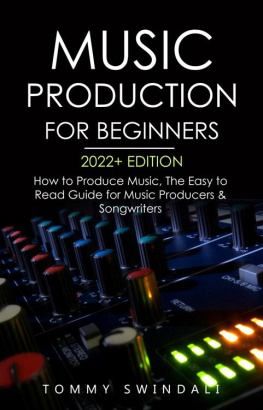
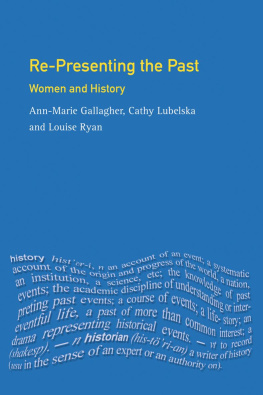
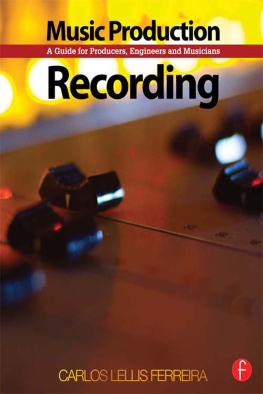
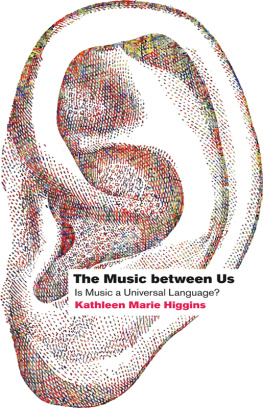
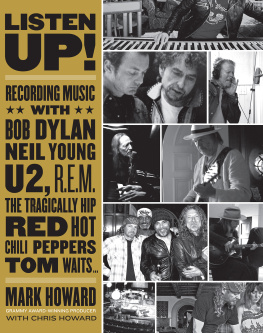

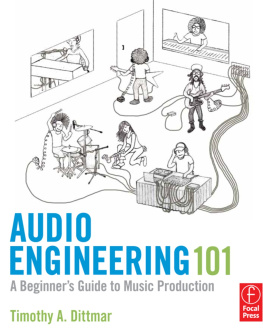


 The paper used in this publication meets the minimum requirements of American National Standard for Information SciencesPermanence of Paper for Printed Library Materials, ANSI/NISO Z39.48-1992.
The paper used in this publication meets the minimum requirements of American National Standard for Information SciencesPermanence of Paper for Printed Library Materials, ANSI/NISO Z39.48-1992.